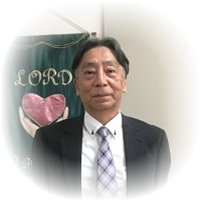↓Audio link to the sermon:(1st worship recording)
(If you can’t listen on your iPhone, please update your iOS)
While Jesus was having dinner at Matthew’s house, many tax collectors and sinners came and ate with him and his disciples. When the Pharisees saw this, they asked his disciples, “Why does your teacher eat with tax collectors and sinners?”
On hearing this, Jesus said, “It is not the healthy who need a doctor, but the sick. But go and learn what this means: ‘I desire mercy, not sacrifice.’ For I have not come to call the righteous, but sinners.”
⑤ During this period, Jewish lands were occupied by the great Roman Empire. The Romans collected a tax of about 30% to 40% of the Jewish people’s income.
Taxes were collected without any leniency, even from the poor who had barely enough to eat. In those days, the Romans also collected a toll fee which would be unthinkable in Japan today. Just for passing through an area, people had to pay a toll. All these taxes were sent back to Rome.
The people who did this work were called tax collectors. Matthew was one of these tax collectors. Naturally, tax collectors were despised by their fellow Jews. In public, people shouted at them “Traitor!” and looked at them with hate.
But this wasn’t the only reason they were hated. Besides doing dirty work for the Roman Empire, they were also dishonest. Instead of sending all the money to Rome, some tax collectors stole part of the money for themselves. They lent the money at high interest, to profit themselves. So it’s no surprise that people hated them.
⑥ As for the tax collector named Matthew . . . In today’s passage, he writes about himself—how he became a follower of Jesus.
This is what verse 9 says. As Jesus went on from there, he saw a man named Matthew sitting at the tax collector’s
booth. “Follow me,” he told him, and Matthew got up and followed him. It might seem like nothing dramatic
happened. But if you think about it, what Matthew did was a big deal.
When Jesus said “Follow me,” Matthew was not on his way out. He was sitting at the tax collector’s booth.
In other words, Matthew was entrenched in his world. So he wants to tell readers how Jesus called out to
him, even a tax collector.
In the same way, Jesus Christ called out to us. We were entrenched in this world, unaware of him, living however we pleased. He did not abandon us, but he called out to us. That is what Matthew wants to convey about Jesus.
Being human, we think, “God won’t call me unless I’m a good person or I’ve enough good deeds.” It’s natural to think this way, but also mistaken. The compassion of our Savior, Jesus Christ, far exceeds our imagination. The way Jesus Christ looks at us is completely different. An unconditional, completely undeserved compassion. This morning, God calls out to us, inviting us to worship together as his people. Let’s remember his deep compassion and love again, and praise him.
⑦ Now, let us look at verses 10 and 11. While Jesus was having dinner at Matthew’s house, many tax collectors and sinners came and ate with him and his disciples. When the Pharisees saw this, they asked his disciples, “Why does your teacher eat with tax collectors and sinners?”
Generally, the term “sinners” was used by Jews to label people who had done something shameful in the eyes
of society. But the proper meaning of the word “sinner,” according to the Bible, is a person who is in opposition
to God. Did the Jews 2,000 years ago understand the idea of “sinner” in light of the Scriptures? It seems they
didn’t. Their understanding of a sinner was quite different from what the Bible actually tells us.
In those days, the Jews had two meanings for the word “sinner.” The first was “a person who does not observe the Law.” More specifically, a person who does not follow the rules set by religious leaders, based on their interpretation of Moses’ Law. The second meaning of “sinner” is a person who is immoral and looked down on by society.
In today’s passage, when the Pharisees used the word “sinner,” they meant this second meaning. They were referring to Matthew, the other tax collectors, and to women who sold themselves as prostitutes out of poverty. “Filthy, those sinners,” is what they were saying.
Yet Jesus was eating at the same table with those people that the religious leaders called “sinners”. Jesus sat down with them as if they were family, people he could show warmth and affection.
The Pharisees were a religious sect that took the Law very seriously. Watching Jesus, they were horrified. “Why?!” they asked. They wanted to know, “Why, Jesus, do you keep such unwholesome company? A man of God like you should avoid being polluted by such people. Must we not keep ourselves pure? So why do you spend time with these people?”
⑧ One of Jesus’s most well-known sayings comes from this passage. See verse 12: On hearing this, Jesus said, “It is not the healthy who need a doctor, but the sick.”
You might see the irony in Jesus’ words. By the way, the word “irony” is often translated into Japanese as “sarcasm”. But Jesus’s ironic words were not intended to be sarcastic or mean. Jesus’ irony does not aim to hurt people but lead them to truth and life.
When we hear those words, we can’t help but ask ourselves, “Which am I: the healthy or the sick?” Jesus’ words are meant to make us reflect on ourselves.
In other words, this is what the Lord was saying to the Pharisees. “It’s true that you are different from these people who are despised by the rest of society. You are well-dressed and well-educated. You don’t do the kind of dirty work they do. But that’s because you came from better families. These people were born into poverty, they have lived through desperation, and they have done shameful things. But they realize that about themselves. They know, ‘I am a disgrace. I am dirty. I am sick.’ They are aware of their own condition. Before the throne of God, they are truly sorry for everything they have done. They have been led to repent. You, on the other hand, do not say, ‘I am sick.’ You do not realize that about yourselves.”
➄ Let me step away from the passage for a moment. When served as a pastor in Aichi Prefecture, I taught Bible stories at Christian kindergarten nearby every week. There we also had a gathering for mothers, where the mothers could ask the pastor anything.
These mothers were young and lively, and they almost seemed like high school students. They asked all kinds of fun questions. At one of those fun meetings, I wrapped up the session by saying, “We have time for one last question. Does anyone have a question?” One mother raised her hand and asked, “Why do Christians go to church every single week?”
I looked at the clock and saw that we had very little time left. So I tried my best to give a short answer. Why
do we attend church every week? I said, “The short answer is this. Christians are like people with a serious
illness, who have to go to the hospital every week. Christians are people who realize they are ill. So that’s
why they feel the need to go to church every week.”
The mothers all seemed surprised. One said aloud, “Really? So, Christians are people who are ill…”
⑥ Coming back to our passage . . . Jesus wanted the Pharisees to realize that they, too, were sick. So he conveyed this through an ironic statement. As for us, Jesus also wants us to ask, “What kind of illness are we suffering from?”
You may have heard of the Danish philosopher Kierkegaard. A few of you may even have read his writing.
Some of you may be think, “I probably wouldn’t understand what he wrote, even if I tried.” That’s what I thought at first too. But when I tried reading his book The Sickness Unto Death, I thought, “Wow, this is interesting . . . and not hard to understand!”
It may sound like a difficult book. But I think that those of you who come to church often would find it both interesting and easy to understand. Well, in the middle of the book, it does become dense and difficult, like any 19th century philosophy book. But at least, the beginning of the book is quite understandable for regular church-goers. When you read it, you’ll say, “Ah, that’s really true!”
Speaking of Kierkegaard, the first part of his name “kirche” means “church” in German. Whereas “garten” means “garden”. This unusual surname means “church garden”. Judging by his family name, this man from Denmark probably had generations of ancestors who lived in a parsonage (the house of a minister attached to a church). Indeed, the philosopher Kierkegaard was raised in a Christian home. So what he writes is built on a Christian foundation. This book I’m talking about comes from a church background.
The “sickness unto death” Kierkegaard writes about is the exact illness that Jesus talks about in today’s passage. What he says to us is this: “Humans suffer from a critical illness. Surely we are in need of a doctor who can heal us.”
Unfortunately, the Pharisees in today’s story did not realize they were suffering from the disease of sin. For
their sake, to help them think and realize their true condition, Jesus made this ironic statement. Verse 13:
“But go and learn what this means: ‘I desire mercy, not sacrifice.’ For I have not come to call the righteous, but
sinners.”
⑦ It was in January that I came to IBF to worship and, at that time, someone prayed a prayer that moved me so much. They prayed, “O God. Because we need your help…”
I’m still thinking about that prayer. Why the words struck me is because they are another way of saying, “O God. I am sick, and I need a doctor. I am full of sin, weak, and need your help and salvation.”
Each and every day, I will be praying together with all of you, “Lord Jesus, we need your help. We need you to rescue us. We need your guidance.” May we cherish each and every day that He gives us. That is my hope.
(If you can’t hear from the bar above, click the blue button)
iPhone




 日本語
日本語